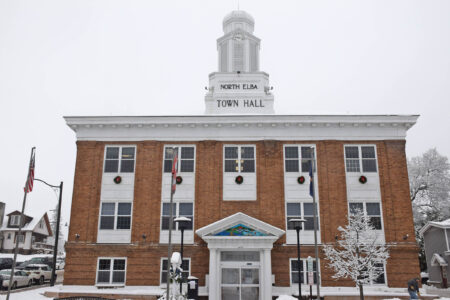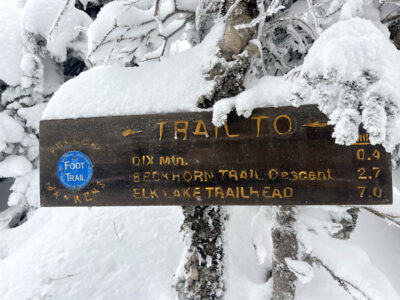Tupper Lake school district adopts cellphone ban
State-mandated policy slated to begin on first day of classes

The Tupper Lake Central School District Board of Education meets in the Middle-High School District library. (Enterprise photo — Chris Gaige)
TUPPER LAKE — The Tupper Lake Central School District Board of Education formally adopted the district’s new cellphone policy in a unanimous vote at its regular monthly meeting Monday evening.
The new policy comes on the heels of a state law that was signed by Gov. Kathleen C. Hochul on May 9, which requires public school districts throughout the state to implement bans on so-called “internet-enabled devices” during the school day. It will be in effect when students come back to school on Sept. 4.
It’s more than just cellphones. Smartphones, tablets, smartwatches, earbuds and any other device that’s capable of connecting to the internet are all included under the law, with districts having little wiggle room to get around the state regulation. School-owned internet-enabled devices, such as Chromebook laptops given to students for instructional uses, are still permitted.
TLCSD’s policy grants several other exceptions where the use of an internet-enabled device is permitted. These include:
¯ If authorized by a principal or the district for a specific educational purpose.
¯ Where necessary for the management of a student’s health care.
¯ In the event of an emergency.
¯ For language translation services.
¯ If a student is a caregiver responsible for a family member’s care and well-being.
¯ Where required by law.
¯ When included as part of an Individualized Education Program.
¯ When included as part of accommodations for students with disabilities.
In accordance with state law, TLCSD’s policy gives parents and guardians two ways to contact students during the school day. One is using the school office phone, where messages can be relayed through staff or by having the student called into the office to speak directly over the phone with their parent or guardian. The other is by dropping off written notes at the building’s main office, which will then be delivered to the student by staff.
TLCSD’s policy notes that parents will be notified of these procedures at the beginning of each school year. TLCSD Superintendent Jaycee Welsh said that she understands that parents may be frustrated with these changes, but noted that, regardless of how people feel about it, this was something the district did not have a choice in. She acknowledged that it’s a big change for many students and their families.
“(For) some other school districts that have struggled with this, it’s the first couple weeks of establishing that new norm for students,” she said. “This will be very different for a large population of our students. So, establishing expectations and making sure they’re clear and making sure all of the teachers are saying the same thing at a consistent rate to the students will be how this is implemented effectively.”
Welsh said the implementation is still underway, and that disciplinary measures for violating the policy will be announced later this summer.
“With our code of conduct, it’s a progressive discipline route where if a student has their cellphone, there’s a specific consequence. If they have it again, there’ll be another specific consequence,” she said. “We’re going to roll that to the community a little bit later this summer when we roll out our code of conduct.”
Suspension, though, is off the table. TLCSD policy states that the district is prohibited from doing so solely for any violations of this policy. Welsh said that while there were many tricky aspects of fine-tuning the policy — which individual districts have some control over at the margins — no suspensions was a no-brainer.
“The whole premise is that cellphones are distracting the instructional setting, so the last thing we want to do is — if a student violates this new ban — remove them from the instructional setting,” she said. “It just doesn’t make any sense.”
While phones are slated to be banned “bell-to-bell” statewide, another area of local control that individual districts have is whether or not internet-enabled devices can be used on school buses. Welsh said TLCSD’s policy allows students to use the devices while on buses. School grounds — where the internet-enabled device ban applies to — include playgrounds, athletic playing fields and any land contained within TLCSD’s real property boundary lines.
Internet-enabled devices may not be stored on one’s person throughout the day, according to Welsh. Students have the option of either keeping them in their lockers or secure storage areas in the building provided by the district. Devices are not allowed to be accessed during non-instructional time during the school day. These include lunch, recess, study halls, homeroom time, tutorial and passing time.
If a student is found to be using an internet-enabled device or has it on their person, the device will be confiscated and placed at a secure location in the building’s main office for the remainder of the school day.
To view the policy, visit tinyurl.com/eza2pjpm.




